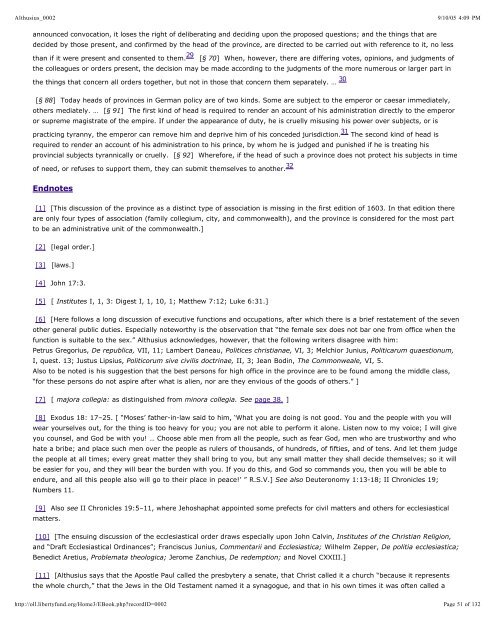Johannes Althusius: Politica - Hubertlerch.com - HubertLerch.com
Johannes Althusius: Politica - Hubertlerch.com - HubertLerch.com
Johannes Althusius: Politica - Hubertlerch.com - HubertLerch.com
Create successful ePaper yourself
Turn your PDF publications into a flip-book with our unique Google optimized e-Paper software.
<strong>Althusius</strong>_0002<br />
9/10/05 4:09 PM<br />
announced convocation, it loses the right of deliberating and deciding upon the proposed questions; and the things that are<br />
decided by those present, and confirmed by the head of the province, are directed to be carried out with reference to it, no less<br />
than if it were present and consented to them.<br />
29<br />
[§ 70] When, however, there are differing votes, opinions, and judgments of<br />
the colleagues or orders present, the decision may be made according to the judgments of the more numerous or larger part in<br />
the things that concern all orders together, but not in those that concern them separately. …<br />
30<br />
[§ 88] Today heads of provinces in German policy are of two kinds. Some are subject to the emperor or caesar immediately,<br />
others mediately. … [§ 91] The first kind of head is required to render an account of his administration directly to the emperor<br />
or supreme magistrate of the empire. If under the appearance of duty, he is cruelly misusing his power over subjects, or is<br />
practicing tyranny, the emperor can remove him and deprive him of his conceded jurisdiction.<br />
31<br />
The second kind of head is<br />
required to render an account of his administration to his prince, by whom he is judged and punished if he is treating his<br />
provincial subjects tyrannically or cruelly. [§ 92] Wherefore, if the head of such a province does not protect his subjects in time<br />
of need, or refuses to support them, they can submit themselves to another.<br />
32<br />
Endnotes<br />
[1] [This discussion of the province as a distinct type of association is missing in the first edition of 1603. In that edition there<br />
are only four types of association (family collegium, city, and <strong>com</strong>monwealth), and the province is considered for the most part<br />
to be an administrative unit of the <strong>com</strong>monwealth.]<br />
[2]<br />
[3]<br />
[4]<br />
[legal order.]<br />
[laws.]<br />
John 17:3.<br />
[5] [ Institutes I, 1, 3: Digest I, 1, 10, 1; Matthew 7:12; Luke 6:31.]<br />
[6]<br />
[Here follows a long discussion of executive functions and occupations, after which there is a brief restatement of the seven<br />
other general public duties. Especially noteworthy is the observation that “the female sex does not bar one from office when the<br />
function is suitable to the sex.” <strong>Althusius</strong> acknowledges, however, that the following writers disagree with him:<br />
Petrus Gregorius, De republica, VII, 11; Lambert Daneau, Politices christianae, VI, 3; Melchior Junius, <strong>Politica</strong>rum quaestionum,<br />
I, quest. 13; Justus Lipsius, Politicorum sive civilis doctrinae, II, 3; Jean Bodin, The Commonweale, VI, 5.<br />
Also to be noted is his suggestion that the best persons for high office in the province are to be found among the middle class,<br />
“for these persons do not aspire after what is alien, nor are they envious of the goods of others.” ]<br />
[7] [ majora collegia: as distinguished from minora collegia. See page 38. ]<br />
[8]<br />
Exodus 18: 17–25. [ “Moses’ father-in-law said to him, ‘What you are doing is not good. You and the people with you will<br />
wear yourselves out, for the thing is too heavy for you; you are not able to perform it alone. Listen now to my voice; I will give<br />
you counsel, and God be with you! … Choose able men from all the people, such as fear God, men who are trustworthy and who<br />
hate a bribe; and place such men over the people as rulers of thousands, of hundreds, of fifties, and of tens. And let them judge<br />
the people at all times; every great matter they shall bring to you, but any small matter they shall decide themselves; so it will<br />
be easier for you, and they will bear the burden with you. If you do this, and God so <strong>com</strong>mands you, then you will be able to<br />
endure, and all this people also will go to their place in peace!’ ” R.S.V.] See also Deuteronomy 1:13-18; II Chronicles 19;<br />
Numbers 11.<br />
[9] Also see II Chronicles 19:5–11, where Jehoshaphat appointed some prefects for civil matters and others for ecclesiastical<br />
matters.<br />
[10] [The ensuing discussion of the ecclesiastical order draws especially upon John Calvin, Institutes of the Christian Religion,<br />
and “Draft Ecclesiastical Ordinances”; Franciscus Junius, Commentarii and Ecclesiastica; Wilhelm Zepper, De politia ecclesiastica;<br />
Benedict Aretius, Problemata theologica; Jerome Zanchius, De redemption; and Novel CXXIII.]<br />
[11]<br />
[<strong>Althusius</strong> says that the Apostle Paul called the presbytery a senate, that Christ called it a church “because it represents<br />
the whole church,” that the Jews in the Old Testament named it a synagogue, and that in his own times it was often called a<br />
http://oll.libertyfund.org/Home3/EBook.php?recordID=0002<br />
Page 51 of 132







